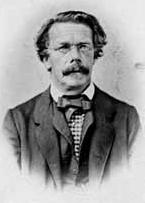Otto Hesse facts for kids
Quick facts for kids
Otto Hesse
|
|
|---|---|
 |
|
| Born | 22 April 1811 |
| Died | 4 August 1874 (aged 63) Munich, Kingdom of Bavaria
|
| Nationality | German |
| Alma mater | Königsberg University |
| Known for | Hessian curve Hessian matrix Hesse normal form Hesse configuration Hessian group Hessian pairs Hesse's theorem Hesse pencil Hesse's principle of transfer |
| Scientific career | |
| Fields | Mathematician |
| Institutions | Polytechnic School |
| Thesis | De octo punctis intersectionis trium superficium secundi ordinis (1840) |
| Doctoral advisor | Carl Gustav Jacob Jacobi |
| Doctoral students | Carl Neumann, Olaus Henrici, Gustav Kirchhoff, Jacob Lüroth, Adolph Mayer, Max Noether, and Ernst Schröder |
Ludwig Otto Hesse (born April 22, 1811 – died August 4, 1874) was an important German mathematician. He was born in Königsberg, which was then part of Prussia. He later passed away in Munich, in what was then Bavaria.
Hesse mostly studied algebraic invariants and geometry. These are branches of mathematics that deal with shapes, spaces, and how things change or stay the same. Several mathematical ideas are named after him, like the Hessian matrix and the Hesse normal form. Many of his discoveries were first shared in Crelle's Journal or in his own math textbooks.
His Life Story
Ludwig Otto Hesse was born in Königsberg, a city now known as Kaliningrad. His father, Johann Gottlieb Hesse, was a businessman and owned a brewery. His mother was Anna Karoline Reiter.
Early Education
Hesse studied at the Albertina in his hometown. There, he learned from famous mathematicians like Carl Gustav Jacob Jacobi. Other important teachers included Friedrich Wilhelm Bessel and Friedrich Julius Richelot.
In 1840, he earned his doctorate degree from the University of Königsberg. His main paper was about how three specific surfaces can cross each other. A year later, in 1841, he finished his habilitation thesis, which allowed him to teach at a university.
Family and Career
In 1841, Hesse married Sophie Marie Emilie Dulk. Her father, Friedrich Philipp Dulk, was a pharmacist and chemistry professor. Ludwig and Sophie had six children together: one son and five daughters.
Hesse first taught physics and chemistry at a vocational school in Königsberg. He also gave lectures at the Albertina university. In 1845, he became an associate professor in Königsberg.
He later moved to different cities for his work. In 1855, he went to Halle, and in 1856, he moved to Heidelberg. Finally, in 1868, he settled in Munich. There, he joined the new Polytechnic School. In 1869, he became a member of the Bavarian Academy of Sciences.
His Students
Many students learned from Ludwig Otto Hesse. Some of his notable students included:
- Olaus Henrici
- Gustav Kirchhoff
- Jacob Lüroth
- Adolph Mayer
- Carl Neumann
- Max Noether
- Ernst Schröder
- Heinrich Martin Weber
His Published Works
Ludwig Otto Hesse wrote several important books and papers about mathematics. These works helped share his ideas with other mathematicians and students.
Some of his well-known publications include:
- Vorlesungen über analytische Geometrie des Raumes. (Lectures on the analytic geometry of space)
- Vorlesungen aus der analytischen Geometrie der geraden Linie, des Punktes und des Kreises. (Lectures from the analytic geometry of the straight line, the point, and the circle)
- Die Determinanten elementar behandelt. (Determinants treated in an elementary way)
- Die vier Species. (The four Species)
His complete collection of works was published in 1897 by the Bavarian Academy of Sciences and Humanities.
See also
 In Spanish: Ludwig Otto Hesse para niños
In Spanish: Ludwig Otto Hesse para niños
 | George Robert Carruthers |
 | Patricia Bath |
 | Jan Ernst Matzeliger |
 | Alexander Miles |

